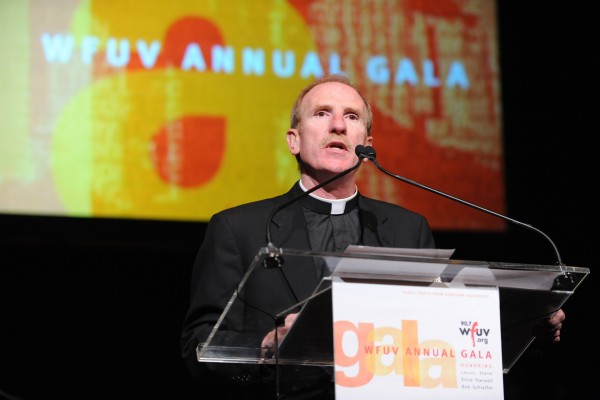McShane Delivers Homily on Race and Racism
Father McShane defined racism as not only a “political, social or economic issue, but a moral one.” (Courtesy of WFUV via flickr)
March 11, 2015
On Sunday, March 1, Fordham students gathered at the Fordham College at Rose Hill (FCRH) University Church for the 11 a.m. Mass, as they do every Sunday. However, this particular Sunday’s congregation included students who usually attend other Masses, and even some who are not Catholic. These individuals came to Mass to hear President of Fordham University Rev. Joseph McShane, S.J., give a homily on race and racism in the United States.
After reading the Gospel, McShane stood at the lectern, breathed deeply and looked over his notes before beginning his homily. The homily – a lesson based on that week’s Scripture readings – is a significant aspect of every Mass, but this one in particular carried the weight of being a public statement by the president of the university on the urgent issue of racism. McShane decried racism as a “sacrament of evil,” and not simply a “political, social or economic issue, but a moral one.” These statements embody the spirit of Catholic anti-racism, which was perhaps most famously manifest in Rev. John La Farge, S.J., the former editor-in-chief of America Magazine who accompanied Dr. Martin Luther King, Jr., on the 1963 March on Washington. McShane called for the conversion of hearts towards racial justice and equality – a difficult and lengthy process, but a complete one.
“I think it is important to have these conversations … and it was nice for Fr. McShane to say the Mass,” Emily Rubino, Fordham College at Lincoln Center (FCLC) ’17, member of the Dorothy Day Center for Service and Justice (DDCSJ), said. “His homily was obviously religious, but it had messages that applied to everyone and I still appreciated it even as a non-religious person.”
The first three rows of pews were reserved for members of the DDCSJ, a special acknowledgement for the campus group that’s mission includes organizing discussions about racism and participating in anti-racist activism and education. The Dorothy Day Center has been particularly involved in addressing this past academic year, reflecting the greater national movement for racial equality in our nation that has gained momentum since this past summer.
Further programming occurred this week, especially at Rose Hill, to continue this discussion of racial justice that McShane participated in through his homily. While racial violence falls out of prominence in the news media, racism continues to affect our nation, even at institutions like Fordham. Events and talks, such as the one given by McShane, serve as reminders to those in our community to continue to combat racism in society.













Pedro Mercado Jr • Feb 22, 2017 at 7:28 pm
Hi is there any way I can get a copy of this homily? I need it for my Catholic Social Thought class. Thank you and God bless!
Pedro